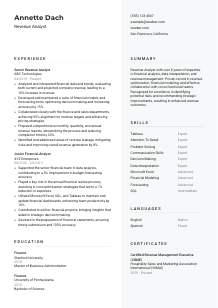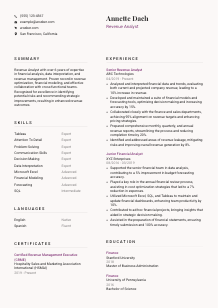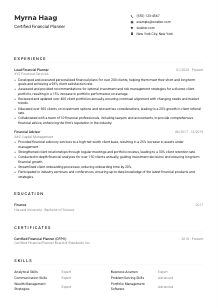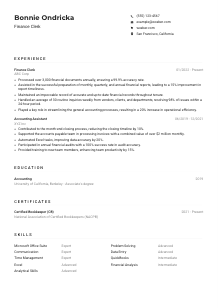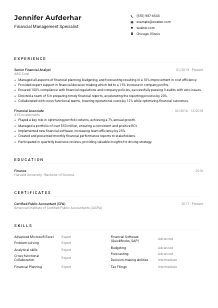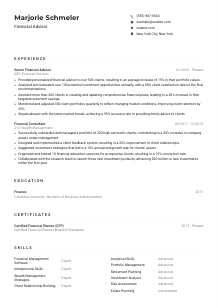Revenue Analyst Resume Example
Delving into dollars, but your resume doesn't add up? Calculate your success with this Revenue Analyst resume example, formulated using Wozber free resume builder. See how you can present your financial finesse to match job criteria with precision, positioning your career to yield the highest returns!

How to write a Revenue Analyst Resume?
Hello, aspiring Revenue Analyst! In the realm of finance and numbers, your resume is a critical tool that sets the stage for your career ascent. It's not just about listing experiences and skills; it's about sculpting a narrative that speaks volumes about your expertise, tailored meticulously to the job you're eyeing.
With the help of Wozber's free resume builder, this guide is your blueprint to crafting an ATS-optimized, compelling resume that aligns perfectly with your desired Revenue Analyst role. Let's dive into transforming your professional story into a beacon that attracts your dream job.
Personal Details
The 'Personal Details' section is more than a formality; it's the opening note of your professional symphony, setting the tone for what follows. Here's how to fine-tune this section to resonate with the Revenue Analyst position, ensuring a striking first impression.
1. Boldly Display Your Name
Think of your name as the headline of your professional narrative. Highlight it with a clear, large font to make it memorable. This is the seed from which your brand grows in the eyes of the hiring manager.
2. Positioning the Title
Directly beneath your name, align your aspirations with reality by stating your desired position: 'Revenue Analyst.' This not only shows conviction but also aligns your identity with the role, making it clear from the get-go what you're aiming for.
3. The Essentials: Contact Info
Your most accessible phone number and a professional email address are key. It's akin to providing a direct line to your executive suite. Remember, clarity is king, so ensure these are typo-free and easy to spot.
4. Geographic Alignment
"San Francisco, California" isn't just a location; it shows you're in the heartbeat of the job's geographical requirement, eliminating any relocation concerns upfront. Proximity can sometimes tilt the scales in your favor.
5. Digital Footprint
If relevant, include a link to your LinkedIn profile or a personal website showcasing your professional accomplishments. Ensure they mirror your resume's narrative, reinforcing your brand's consistency.
Takeaway
Crafting the Personal Details section is akin to laying the foundation of your professional brand. Precision, clarity, and alignment with the job's specifics set the stage for a standout introduction. Think of it as your professional handshake – firm, confident, and leaving a lasting impression.





Experience
Your experience is the plot of your career story where your analytical prowess shines bright. Tailoring this section to reflect the essence of the Revenue Analyst role is your golden opportunity to showcase your fit for the position.
- Analyzed and interpreted financial data and trends, evaluating both current and projected company revenue, leading to a 10% increase in revenue.
- Developed and maintained a suite of financial models and forecasting tools, optimizing decision‑making and increasing accuracy by 15%.
- Collaborated closely with the finance and sales departments, achieving 95% alignment on revenue targets and enhancing pricing strategies.
- Prepared comprehensive monthly, quarterly, and annual revenue reports, streamlining the process and reducing completion time by 20%.
- Identified and addressed areas of revenue leakage, mitigating risks and improving overall revenue generation by 8%.
- Supported the senior financial team in data analysis, contributing to a 5% improvement in budget forecasting accuracy.
- Played a key role in the annual financial review process, assisting in cost optimization strategies that led to a 7% reduction in expenses.
- Utilized Microsoft Excel, SQL, and Tableau to maintain and update financial dashboards, enhancing team productivity by 10%.
- Contributed to ad‑hoc financial projects, bringing insights that aided in strategic decision‑making.
- Assisted in the preparation of financial statements, ensuring timely submission and 100% accuracy.
1. Dissect the Job Description
Begin by meticulously going through the job description, underlining key phrases like 'analyze and interpret financial data and trends' or 'develop financial models.' These are your beacons when aligning your experience.
2. Chronological Clarity
Organize your roles from the most recent backward, ensuring each position's title, the company's name, and your tenure are clearly laid out. This structure instantly communicates your career trajectory to hiring managers.
3. Achievement-Focused Bullet Points
Under each role, craft bullet points that match the job's requirements, such as 'Collaborated with finance and sales to meet revenue targets.' Use action verbs and quantify achievements where possible to add credibility.
4. Numbers Speak Louder
Quantifying your contributions, such as 'led to a 10% increase in revenue,' provides tangible evidence of your impact. It transforms your resume from a list of duties to a testament of your results-driven approach.
5. Relevancy is Key
Stick to the script of the Revenue Analyst role. Extraneous details may dilute your message. Each bullet point should contribute directly to painting a picture of a capable and experienced Revenue Analyst.
Takeaway
Think of your experience section as a symphony where each role you've played contributes to an impressive opus. The art is in the selection and presentation of these experiences, making sure they resonate harmoniously with the needs of a Revenue Analyst role. Highlight, quantify, and tailor, ensuring your professional journey sings the right melodies to capture the attention of your future employer.
Education
For a Revenue Analyst, the foundation of your expertise lies in your educational background. Here's how to sculpt this section to underscore your qualification for the role, based on the directives of our example.
1. Identify the Precise Requirement
Pinpoint the exact educational qualifications listed in the job description. Here, a 'Bachelor's degree in Finance, Accounting, or a related field' is your cue to ensure your relevant education is front and center.
2. Structure with Elegance
Present your educational achievements in a simple, elegant format. Start with your degree, the field of study, and then the institution, followed by the graduation date. This clear path leads hiring managers through your academic journey with ease.
3. Align Your Degree
If your degree directly matches one listed in the job description, such as 'Bachelor of Science in Finance,' make it prominent. This is an immediate tick in the box for essential qualifications.
4. Coursework Highlights
While not always necessary, mentioning relevant coursework or specializations can be beneficial, especially if they directly relate to the skills and knowledge required for a Revenue Analyst.
5. Additional Academic Achievements
If you've acquired other educations, such as a 'Master of Business Administration,' which enhance your candidacy, include them. This shows a dedication to your field beyond the basic requirements.
Takeaway
Your education section is not just a list; it's a narrative of your academic endeavors that have prepared you for the Revenue Analyst role. Crafted thoughtfully, it signals to employers not only that you meet the basic requirements but that you're a candidate of depth, dedication, and continuous learning. It's an essential chapter in your professional story, make it impactful.
Certificates
In the dynamic field of finance, certifications can significantly bolster your application by further proving your expertise and commitment. Let's explore how to strategically list these to shine in your Revenue Analyst resume.
1. Align with Desired Qualifications
Highlight certifications like the 'Certification in Financial Modeling and Analysis (CFM)' or 'Certified Revenue Management Executive (CRME)' that directly match the job's preferences. This immediately showcases your qualifications and dedication.
2. Selectivity is Crucial
Choose to list certifications that are most relevant to the role of a Revenue Analyst. A focused list is more impactful than a lengthy compilation of every certification you've ever earned.
3. Dates Matter
For certificates with validity periods, including the date can be beneficial, suggesting current competence, especially in fast-evolving fields like finance and revenue analysis.
4. Continuous Learning
Showcasing a commitment to continuous learning through up-to-date certifications or pursuing new ones can greatly impress employers, painting you as a candidate who values growth and relevancy.
Takeaway
In a competitive field like finance, certifications are more than just accreditations; they are emblems of your specializations and continuous pursuit of excellence. Thoughtfully selected and presented, they frame you as a candidate who is not only qualified but also committed to staying at the forefront of your field. Let your certifications underscore your readiness and zest for the Revenue Analyst role.
Skills
The skills section is where you get to shine a spotlight on your professional toolkit, tailor-made for the role of a Revenue Analyst. Here's how to curate a compelling narrative that resonates with the skill set sought by employers.
1. Dissect the Job Description
Start by extracting key skills directly mentioned in the job posting, such as 'proficient in financial analysis tools' and 'strong attention to detail.' This ensures your resume speaks the same language as the employer's needs.
2. Prioritize Alignment
Matching your skills list directly with those highlighted in the job description ensures a laser-focused section. For a Revenue Analyst, emphasizing proficiency in tools like Microsoft Excel, SQL, and Tableau is crucial.
3. Organize for Impact
Keep this section neat and prioritize the skills that are most relevant to the job at hand. An organized, tailored list showcases your most applicable strengths and makes for an ATS- and human-friendly read.
Takeaway
Your skills section is a highly concentrated extract of your professional prowess, distilled into a list that speaks directly to the needs of a Revenue Analyst role. Polished and aligned, it persuasively communicates you're not only a fit but a standout candidate who's equipped with the right tools for the job. Embrace this opportunity to distinguish yourself by presenting a curated arsenal of your capabilities.
Languages
In a global economic landscape, linguistic abilities can significantly bolster your profile. Let's uncover how to effectively integrate language skills into your resume, enhancing your appeal for the Revenue Analyst position.
1. Align with Specific Needs
Begin by addressing the primary language requirement—'English language proficiency is a must'—clearly listing it and indicating your level of mastery, such as 'Native.'
2. Additional Linguistic Abilities
Beyond the basics, listing additional languages can illustrate your adaptability and global perspective, valuable traits in any analytical role. If proficient, include languages like Spanish, marked as 'Fluent,' to showcase your broader communicative capabilities.
3. Honest Proficiency Ratings
Employ precise terms like 'Native,' 'Fluent,' 'Intermediate,' and 'Basic' to describe your proficiency levels. This honesty gives hiring managers a clear understanding of your communicative breadth.
4. Evaluate Role Scope
Consider how language skills might specifically benefit the role of a Revenue Analyst. In positions involving cross-border communication or international market analysis, these skills could significantly elevate your candidacy.
5. Lifelong Learning
Displaying continuous learning in language capabilities, like taking courses or obtaining certifications, showcases an enduring commitment to enhancing your global business communications.
Takeaway
Your proficiency in diverse languages is more than just a skill—it's a testament to your adaptability and readiness to thrive in a global marketplace. By thoughtfully integrating language skills into your resume, you're not just ticking a box; you're showcasing a multi-dimensional asset that enriches your profile for the Revenue Analyst role and beyond. Let your languages narrate your openness to the world, inviting opportunities and connections across borders.
Summary
The summary section is where you encapsulate your essence as a Revenue Analyst. It's about crafting a concise narrative that instantly communicates your suitability and zeal for the role. Here's how to make your summary a powerful opener to your resume story.
1. Capture the Job's Core
Absorb and reflect the core requirements of the Revenue Analyst position, focusing on key phrases like 'financial data analysis' and 'revenue optimization' to echo the job's language in your summary.
2. Introduce Yourself
Begin with a concise statement that positions you within your field, such as 'Revenue Analyst with over 6 years of expertise.' This grounds your summary in your professional identity.
3. Highlight Key Skills and Achievements
Mention a few pivotal skills and significant achievements that align with the job description, illustrating the impact you've made in your field and asserting your potential contribution.
4. Concision is Your Friend
This is your elevator pitch, not your complete story. Aim for brevity and punch, encapsulating your candidacy's essence in a few compelling lines that make hiring managers want to read on.
Takeaway
A compelling summary does more than introduce; it captivates, promising the reader a candidate whose profile is both fitting and fascinating. By tightly aligning it with the role of Revenue Analyst, you lay down a powerful opening statement for your resume. It's not just about making a good first impression—it's about making an unforgettable one.
Launching Your Journey as a Revenue Analyst
Congratulations on meticulously tailoring your resume to the Revenue Analyst role! With this guide and the Wozber free resume builder at your disposal, you've crafted an application that's not only ATS-compliant but also a true reflection of your professional narrative. Your resume is now a beacon, primed to guide you towards your next big opportunity. Remember, each section of your resume contributes to your story.
Keep refining, keep updating, and let your resume be the bridge to your aspirations. The financial landscape awaits your expertise; it's time to make your mark. Happy job hunting!

- Bachelor's degree in Finance, Accounting, or a related field.
- Minimum of 3 years of experience in revenue analysis, finance, or a related function.
- Proficient in financial analysis tools such as Microsoft Excel, SQL, and Tableau.
- Strong attention to detail, problem-solving, and communication skills.
- Certification in Financial Modeling and Analysis (CFM) or Certified Revenue Management Executive (CRME) preferred.
- English language proficiency is a must.
- Must be located in San Francisco, California.
- Analyze and interpret financial data and trends to evaluate current and projected company revenue.
- Develop, maintain, and update financial models and forecasting tools to support revenue decision-making.
- Collaborate with finance and sales teams to set and achieve revenue targets, and optimize pricing strategies.
- Prepare monthly, quarterly, and annual revenue reports for senior management.
- Identify areas of revenue leakage, potential risks, and provide recommendations for improvement.






